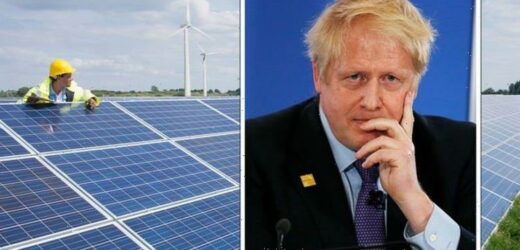Meghan and Harry’s ‘net-zero’ pledge discussed by expert
We use your sign-up to provide content in ways you’ve consented to and to improve our understanding of you. This may include adverts from us and 3rd parties based on our understanding. You can unsubscribe at any time. More info
Two campaign groups separately filed court papers on Wednesday – ClientEarth and Friends of the Earth (FoE). ClientEarth claimed that the failure to meet legal carbon budgets would violate the Human Rights Act. This is because they claim this would impact young people’s right to life and family life. The Government’s net zero strategy was published back in October.
It includes commitments like ending the sales of new fossil fuel cars by 2030 and gas boilers by 2035.
But the lawyers said it does not specify how the strategy would be delivered.
They also said that it was not made clear which cuts in emissions should be achieved in each sector.
According to the lawyers, the strategy relied on speculative technologies like zero-carbon aviation fuels.
This is not the first time these groups have taken the Government to court.


In fact, ClientEarth has defeated the Government three times in court in recent years over air pollution policies.
FoE has also taken the Government to court and won a case about the cost of bringing environmental claims against ministers.
Both groups uphold that the Climate Change Act states that ministers must lay out policies to meet carbon budgets “as soon as reasonably practicable” once set.
And the assessment included in the net zero strategy shows UK emissions being double the level allowed in 2035.
The assessment also predicted the Government will miss 2025 and 2030 targets.

Lawyer Sam Hunter Jones at ClientEarth, said: “A net zero strategy needs to include real-world policies that ensure it succeeds.
“Anything less is a breach of the Government’s legal duties and amounts to greenwashing and climate delay.
“The government’s pie-in-the-sky approach pushes the risk onto young people and future generations who stand to be hit hardest by the climate crisis.”
Another strategy on heat and building has also been slammed by FoE.
That is because it failed to assess its impact on groups protected in law, including children, people of colour and those with disabilities, FoE claimed.
DON’T MISS
Truss poised to deny EU £15bn with Article 16 threat [REVEAL]
Joe Biden rescues EU as booster gas supply eases Russian pressure [REPORT]
Tutankhamun’s death debunked after researchers found key clue [INSIGHT]

It also found that people of colour were twice as likely to be living in fuel poverty as white people.
Katie de Kauwe, an FoE lawyer, said: “We know that those who do least to cause climate breakdown are too often the hardest hit.
“Climate action must be based on reversing these inequalities, by designing the transition with the most vulnerable in mind.
“Not even considering the implications of the heat and building strategy on such groups is quite shocking.”
Despite the backlash, the Climate Change Committee (CCC) said back in October that the Government’s net zero strategy was a “big step forward”.
But the committee members, who are the government’s official advisers, have said: “The government has not quantified the effect of each policy and proposal on emissions.
“So … it is not clear how the mix of policies will deliver on its ambitions.”

Wera Hobhouse, an MP for the Liberal Democrats, wrote on Twitter: “A real test whether the government can get away with talking the talk but not actually delivering the action required to get to net zero.
“Tories are clearly delaying Climate Action. Are they in breach of the law?”
James Murray, editor of Incisive, posted: “This has been brewing for ages and was pretty inevitable given the Net Zero Strategy declined to include projections showing precisely how carbon budgets would be met.”
Commenting on the allegations, a Government spokesperson said: “The net zero strategy sets out specific, detailed measures we will take to transition to a low carbon economy, including helping businesses and consumers to move to clean and more secure, home-grown power, supporting hundreds of thousands of well-paid jobs and leveraging up to £90billion of private investment by 2030.”
Source: Read Full Article


